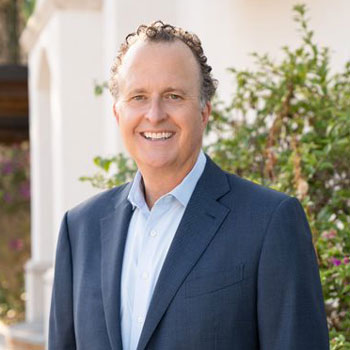CTO Realty Growth, Inc. (NYSE: CTO) has been on a journey the past few years, one that has involved a name change, conversion to a REIT, and a strong focus on active portfolio management. While constantly working to refine the company, CTO has largely transformed itself into a pure-play, retail-focused REIT, operating in markets where it sees outsized long-term growth potential.
The Winter Park-Florida based REIT owns and operates a portfolio of high-quality, retail-based properties located primarily in higher growth markets in the United States. Additionally, the company externally manages and owns a meaningful interest in Alpine Income Property Trust, Inc. (NYSE: PINE), a publicly traded net lease REIT.
CTO, which historically operated under its legacy name, Consolidated-Tomoka Land Co., has been around for more than 110 years.
“Basically, it started out from a Chicago financier who bought up almost two million acres of timberland in Florida,” says John Albright, president and CEO of CTO. Throughout the 1920s and 1930s, the company started opportunistically selling that land, and in 1969 it went public as a spin out from the larger diversified conglomerate. Throughout the years following, it continued to sell land and acquired income properties around the country, culminating with the conversion from a C-Corp to a REIT in 2020.
“We went from an agriculture-sort of company to income properties and a dividend-oriented company,” Albright says. “Through that process, now virtually all of our assets are income-oriented. We do still have some legacy properties, but there isn’t much remaining from the land-focused predecessor company, Consolidated-Tomoka. As we’ve refined the portfolio, we’re very focused on properties in the Southeast and Southwest, as we look to acquire more high-quality, larger format retail properties in business friendly states with faster growing markets.”
For instance, this June, CTO acquired Plaza at Rockwall, a 446,500-square-foot retail power center in Dallas in a $61.2 million deal, one Albright notes was a great opportunity to increase the REIT’s exposure to the Dallas-Fort Worth metroplex in a high barrier-to-entry submarket with accretive demographics.
Attractive Attributes
For a property to be a good fit for CTO, the REIT mainly looks for solid real estate fundamentals—investing in locations that will be winners over the long term with regards to demographics, job growth, and population growth.
“The backdrop of the thesis is that we are in business-friendly states and low tax states where, especially after the pandemic, you’ve seen these locations become clear winners as people and business have migrated to these areas,” Albright says. “Within these markets, we concentrate on the second and third ring suburbs outside of city centers, where the population has moved.”
CTO’s largest share of properties is in Georgia, and Atlanta is the largest market in its portfolio. “That is a city that’s really enjoyed an incredible amount of growth and has seen a lot of corporate relocations,” Albright says. “Dallas is our second largest city. We also have a good presence in Phoenix and Houston, and we’re also in the Carolinas where we’d like to find more opportunities.”
Before the Plaza at Rockwall deal, CTO made a $96 million purchase in December 2022 of the 560,000-square-foot Collection at Forsyth, a mixed-use property in the Forsyth County submarket of Atlanta.
“Forsyth is one of the wealthiest counties in Georgia,” Albright says. “This was a big lifestyle center, probably built 15 years too early. Now it’s coming into its own as the population has certainly grown in north Atlanta. There are big houses, big families, and good school districts, and that checks a number of our boxes. We bought below replacement cost at a high current yield and there’s some vacancy for us to lease up to even enhance the yield further.”
Another deal from 2022 was a $93.9 million acquisition of West Broad Village, a 392,000-square-foot mixed-use, Whole Foods-anchored property in Richmond, Virginia. “It had a lot of residential around it, strong demographics, and value-add lease up opportunities, so we liked it a lot,” Albright says.
Overall, CTO has acquired more than $330 million in assets in just the past twelve months, making it one of the more active retail-focused REITs as it looks to find opportunities to grow its portfolio in what has been an ever-changing transaction market.
Shaping the Company
In addition to John Albright, CTO’s execution has been led by Matthew Partridge, who serves as senior vice president, CFO and treasurer, and Steven Greathouse, CTO’s senior vice president and CIO. The leadership team, which also includes long-time General Counsel and Corporate Secretary Daniel Smith and Chief Accounting Officer Lisa Vorakoun, have built an efficient and talented team that allows CTO to act faster than many others in the space.
CTO’s strategy takes a bit of a contrarian bent—buying when there’s not a lot of buyers out there and selling when the competition for the same assets comes on strong.
“We’ll step out and look for other ways to grow the company during those periods,” Albright says. “What distinguishes us is that given that we’re small, we’re a little bit more nimble and willing to pivot when we need to, to kind of stay out of the way of the bigger horses in the market.”
Among the company’s top selling points, according to Albright, are its high dividend yield, its ability to buy at very attractive valuations, and a strong implied cap rate.
“You’re buying the portfolio below replacement costs; they’re not going to build any more of these retail centers around the country,” he says. “If you have well-located real estate, and you have great demographics and the support of the market where there’s tenant activity, there’s really no way to lose.”
RJ Milligan, equity research analyst for Raymond James, notes that CTO has a differentiated strategy focused on markets with outsized job growth and improving demographics that should drive higher rents and higher asset values over time.
“Management has been able to execute on efficient asset recycling, selling lower growth and non-core assets and buying properties with leasing upside and redevelopment opportunities,” he says. “We actually like that the company is relatively small compared to peers, which allows them to cherry-pick the best risk-adjusted acquisition opportunities and generate meaningful NOI growth through executing on just a few of their lease-up/value add acquisitions.”
He adds that as of mid-June, the company has around $4 million of rent signed but not yet open, which should drive outsized same-store NOI growth in the second half of 2023 and into 2024.
“It’s hard to ignore the company’s well-covered 9.5% dividend yield,” Milligan says. “We also think investors should appreciate the fact that CTO has no near-term debt maturities, which is obviously a positive given the current state of the debt markets.”
During the pandemic, the properties that CTO owned were considered “COVID winners” and the company continues to concentrate on more of the same in a post-pandemic world.
“COVID battle-tested our portfolio, and it did really well,” Albright says. “Our properties are improving after COVID, which gives us a good indication of where we need to be and what we need to concentrate on.”
As for other challenges, Albright points to capital markets, but shares that he sees that almost as more of an opportunity for public companies and notes that CTO is looking at purchasing more properties.
“There’s not a lot of buyers in the market because there’s no financing for the private sector. Given that we have nice availability of credit from being a public company and a support group of great banking partners, we’ll continue to use those sources to acquire when we see good opportunities,” Albright says. “The other part of that is the stock price. Our common dividend yield is very high—almost 9.5%, so it’s a great opportunity for investors, but not great that the market is fearing that retail is being mixed in with office and some of the other headlines out there on the commercial real estate side.”
Growth Strategy
CTO’s philosophy revolves around buying really well-located assets in good geographic areas and enhancing the portfolio by improving it over time.
“We’re growing by selling some of our smaller assets and recycling those into these larger format centers where we have good synergies,” Albright says. “That execution, combined with acquired lease up opportunities and active asset management, is how we’re going to grow given that the capital markets are constrained right now. It’s really just about keeping on improving the portfolio, making good acquisitions, selling properties at accretive prices, and grinding away.”
Rob Stevenson, head of real estate equity research for Janney Montgomery Scott, has been covering CTO even before it converted to a REIT. He believes investors are attracted to the REIT due to its growth profile, and the fact it’s able to accomplish this growth without issuing external capital, as the majority of the capital for acquisitions has come from recycling assets.
“Plus, you have a high dividend yield and no debt maturities over the next couple of years, which is also an attractive quality in the marketplace right now,” Stevenson says.
“We’re basically a company that has a clean slate in the locations where you want to be,” Albright says. Those locations include some of the top markets in the country, with Atlanta; Dallas; Richmond, Virginia; Jacksonville, Florida; Phoenix, Raleigh, North Carolina; Houston; Tampa; Salt Lake City; Las Vegas; and Orlando all benefitting from significant corporate relocations and population shifts over the past few years.
“Combine these locations with a strong leasing environment, thoughtful asset management, and little-to-no new retail development expected for the foreseeable future, and there is a clear opportunity for CTO to deliver outsized growth and strong investor returns over the next few years,” Albright says, as CTO continues to perfect the plan that has got the REIT to where it is today.



